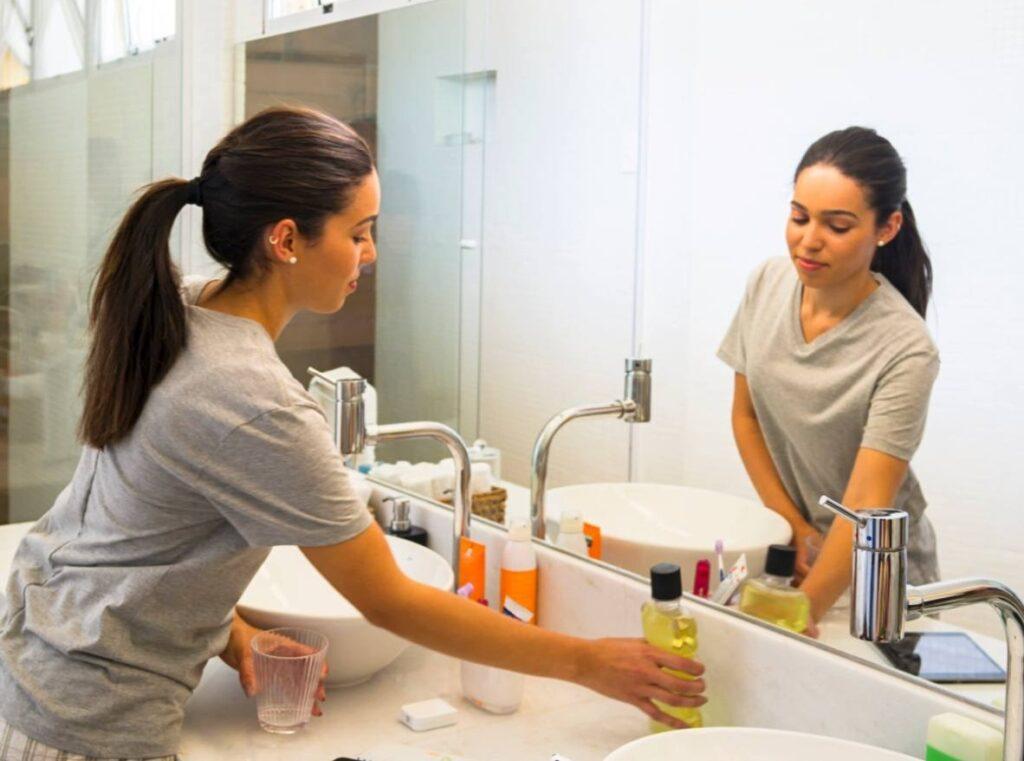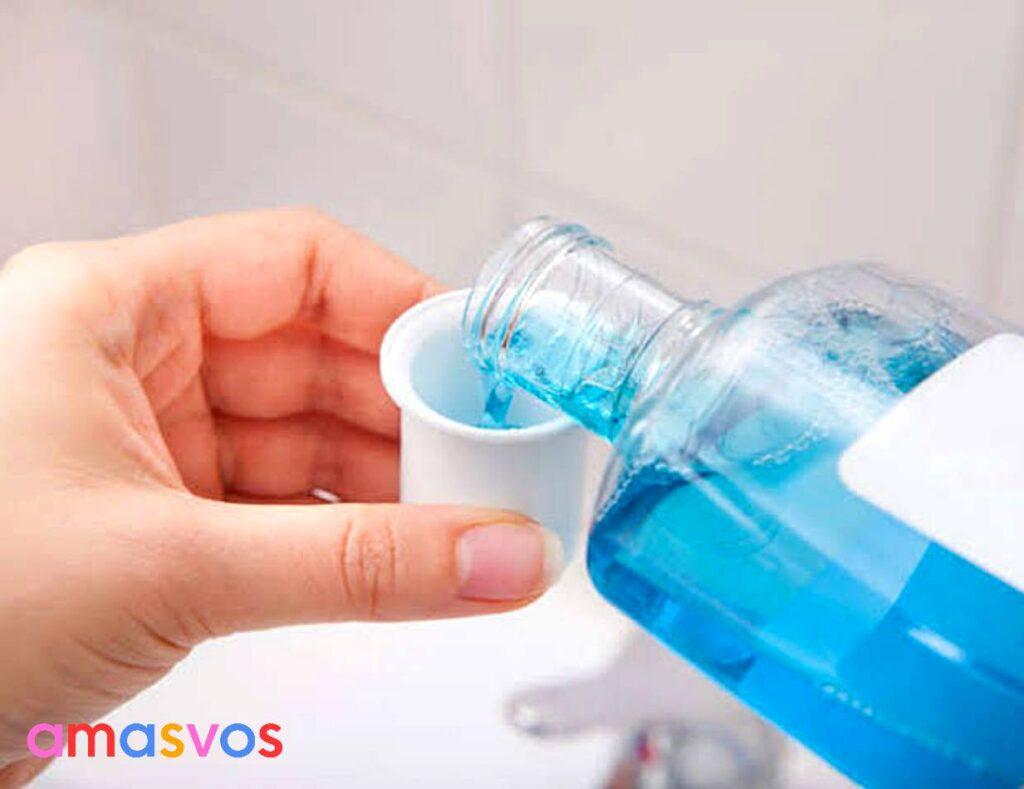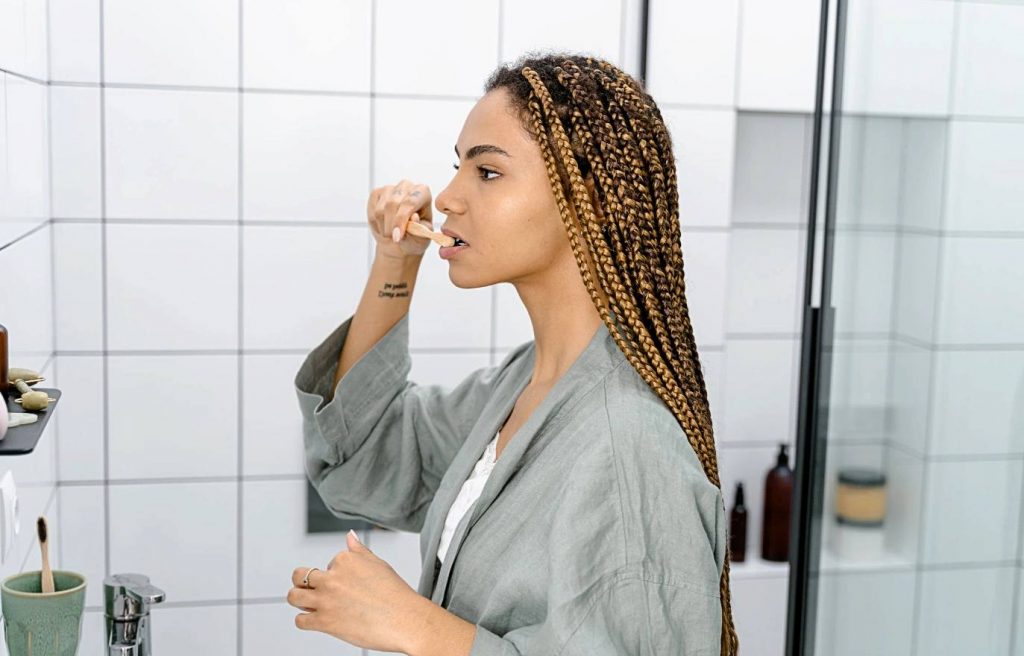Introduction:

“Can I use mouthwash after tooth extraction?” is a commonly asked question. In this helpful article, we will look at all aspects of post-tooth extraction oral care and decide whether including mouthwash into your daily routine is a good option for encouraging healing and maintaining oral cleanliness.
We believe that by diving into the issue, we will be able to offer you with a full explanation of how mouthwash fits into your post-extraction care routine.
Also, it will help you make knowledgeable selections that will aid in your recovery and general oral health.
So, join us on this interesting voyage as we uncover the relevance of mouthwash in the context of tooth extraction recovery, emphasizing the do’s and don’ts, and assuring the lifetime of your smile.
What Is Mouthwash?

Mouthwash is a fluid used to rinse the mouth after brushing and flossing the teeth. Its primary purposes are to kill bacteria, freshen breath, and improve oral hygiene.
Mouthwash typically contains antiseptic or antibacterial compounds such as chlorhexidine, cetylpyridinium chloride, or hydrogen peroxide to reduce the quantity of hazardous microorganisms in the mouth.
Fluoride is a component in numerous mouthwashes that aids in the formation of tooth enamel and the prevention of tooth decay. Furthermore, mouthwashes can enhance one’s look by whitening teeth or refreshing the breath.
Mouthwash, on the other hand, should be used as part of a comprehensive dental care regimen, not as a replacement for regular brushing and flossing.
Can I Use Mouthwash After Tooth Extraction?

Absolutely No.
It is not recommended to use mouthwash immediately after a tooth extraction since the rinse can prevent a blood clot from developing in the socket.
The blood clot is an important part of the healing process because it helps to maintain the underlying bone and tissue while also encouraging the creation of new tissue.
Breaking up a blood clot after a tooth extraction may result in the painful condition known as dry socket, which can delay healing and demand further treatment.
Furthermore, several mouthwashes may include alcohol or other compounds that may irritate the gums and slow the healing process.
Additional Information:
It’s essential to take proper care of the area after a tooth extraction to improve healing and prevent infection.
While mouthwash can assist to eradicate bacteria in the mouth, you should consult with your dentist or oral surgeon before taking it following a tooth extraction.
They may advise you to wait a set period of time before using mouthwash, as well as a certain type of mouthwash that is soft enough for the delicate area surrounding the extraction site.
In addition to mouthwash, your dentist or oral surgeon may advise you to rinse gently with salt water to keep the region clean.
It is vital to carefully follow their advice in order to promote appropriate healing and reduce the chance of problems.
Please also read this other article: What Can I Eat After Tooth Extraction?
What Kind Of Mouthwash Can You Use After Tooth Extraction?

After a tooth extraction, your dentist or oral surgeon may suggest a gentle mouthwash that will not irritate the area around the place where the tooth was extracted.
They usually recommend using an antibacterial mouthwash containing chlorhexidine since it can help to kill oral germs and reduce the risk of sickness.
Before taking any mouthwash, consult with your dentist or oral surgeon, as they may have specific advice based on your specific circumstances.
They may also suggest waiting a certain amount of time before using mouthwash to allow the area to recuperate after the extraction.
It is vital that you rigorously follow their instructions in order to facilitate healthy recuperation and reduce any potential complications.
Another Reading For You!
How Long Until I Can Use Toothpaste After Tooth Extraction?

It’s necessary to be careful with the region after a tooth extraction to ensure healthy healing and reduce the chance of problems. What you should know about using toothpaste after a tooth extraction is as follows:
It is normally okay to begin brushing your teeth with toothpaste 5 days after the extraction.
However, during the first few days, it’s essential to be cautious and avoid brushing directly over the extraction site. Instead, concentrate on cleaning your other teeth as gently as possible.
If you suffer any pain or bleeding from the extraction site while brushing, stop immediately and consult your dentist or oral surgeon.
It’s also a good idea to avoid toothpastes with abrasive components or strong scents, since they might irritate the sensitive region surrounding the extraction site.
Your dentist or oral surgeon may prescribe a mild toothpaste that will not irritate your skin.
In addition to brushing, it is vital to rinse your mouth with warm salt water many times each day to maintain the region clean and encourage healing.
To promote good healing and to avoid any potential issues, make sure to follow any further instructions or recommendations from your dentist or oral surgeon.
If you have any concerns or questions regarding using toothpaste following a tooth extraction, please contact your dental expert.
What Happens If You Rinse After Extraction?

It is essential to care for the extraction site after a tooth extraction to improve healing and avoid problems.
Rinsing your mouth can help keep the region clean, but it’s vital to use caution to prevent damaging the socket.
Typically, your dentist will give you gauze to help stop the bleeding, which you should keep in place for the prescribed period of time.
You should avoid washing your mouth during this time. After the bleeding has stopped, your dentist may advise you to rinse your mouth with a saltwater solution to avoid infection.
Additional Information:
When washing your mouth following an extraction, it’s vital to follow your dentist’s recommendations. Alcohol-containing mouthwash should be avoided since it might slow the healing process.
If you rinse your mouth too soon after the extraction, you risk dislodging the blood clot that develops in the socket, which can cause bleeding and cause recovery to be delayed.
To guarantee a smooth and quick recovery, be patient and attentively follow your dentist’s advice.
This involves washing your mouth after the appropriate time and using the approved rinsing solution. If you have any questions or concerns concerning post-extraction care, you should seek guidance from your dentist.
This other article can also guide you: Smoking After Tooth Extraction With Gauze
When Can I Rinse After Tooth Extraction?

However, it is important to prevent dislodging the blood clot that forms in the socket by waiting until the optimum moment to rinse your mouth.
After the bleeding has stopped, your dentist may advise you to rinse your mouth with a saltwater solution to keep the region clean and aid healing.
You should typically wait at least 24 hours following the extraction before washing your mouth. When rinsing, be careful and avoid spitting hard, since this may dislodge the blood clot.
To ensure a smooth and quick recovery, please follow your dentist’s advice.
If you have heavy bleeding, intense pain, or other troubling signs, consult your dentist right away.
Also, ensure that the extraction site heals properly and minimize problems by providing adequate post-extraction care.
How Do You Clean Your Mouth After A Tooth Extraction?

It’s essential to keep your mouth clean after a tooth extraction to improve healing and prevent infection. Following a tooth extraction, you should clean your mouth as follows:
- For the first hour or so following the extraction, bite down on a piece of gauze to help stop any bleeding. Change the gauze as needed and safely dispose of it.
- To avoid accidentally biting your tongue or cheek, wait for the anesthetic to wear off before washing your mouth.
- Gently clean the teeth and gums around the extraction site using a soft-bristled toothbrush. Avoid brushing directly over the extraction site and be careful.
- To keep the region clean and aid healing, gently rinse your mouth with warm salt water several times each day. Mix one teaspoon of salt with eight ounces of warm water to produce salt water rinse.
- For the first 24 hours following the extraction, avoid spitting or using mouthwash since it may cause irritation or dislodge the blood clot that develops in the extraction site.
- Your dentist or oral surgeon may suggest a special kind of mouthwash after 24 hours to help kill bacteria and avoid illness. Pay close attention to their directions.
- Finally, if you have any concerns or questions regarding cleaning your mouth following a tooth extraction, see your dentist or oral surgeon.
Another Reading For You!
What Is The Healing Time After Tooth Extraction?
Here is an outline of what to expect during the healing time after a tooth extraction, it’s broken down into days, weeks, and months:
Days 1-2:
Days 3-7:
Weeks 1-2:
Months 1-2 (and beyond):
It might take several weeks or even months for a tooth extraction site to recover completely.
The first healing stage usually lasts around 1-2 weeks, during this period the extraction site gradually closes and begins to recover. The underlying bone and gum tissue, on the other hand, may take longer to recover.
The extraction site may look entirely healed on the surface during the initial healing phase, but it might take several months for the underlying bone and gum tissue to rebuild completely.
During this period, it is essential to maintain proper oral hygiene by carefully brushing and flossing the teeth surrounding the extraction site, as well as following any additional advice provided by your dentist.
A follow-up session with your dentist may be recommended to check the healing process and confirm that no issues have emerged.
Contact your dentist if you are experiencing any pain, swelling, or other concerned symptoms.
Conclusion
In conclusion, it is essential to fully understand the function of mouthwash in post-tooth extraction care in order to promote healing and preserve oral cleanliness.
Before introducing mouthwash into your routine, you must speak with your dentist or oral surgeon since they may offer tailored advice.
To avoid discomfort, it is advised to use a mild mouthwash designed for sensitive mouths that is free of alcohol. Use of mouthwash should be suspended for at least 24 hours following the extraction to allow for early healing.
However, follow your dentist’s recommendations regarding the timing. Mouthwash should complement, not replace, other oral care practices such as gentle brushing, regular flossing, a balanced diet, and dental check-ups.
If you experience severe pain or other concerning symptoms, contact your dentist promptly.
By making informed decisions and following recommended guidelines, you can actively contribute to your oral health and recovery, with mouthwash as a helpful ally.
Embrace the healing process, and trust your dental team to support you along the way, ensuring a lifetime of radiant smiles.


